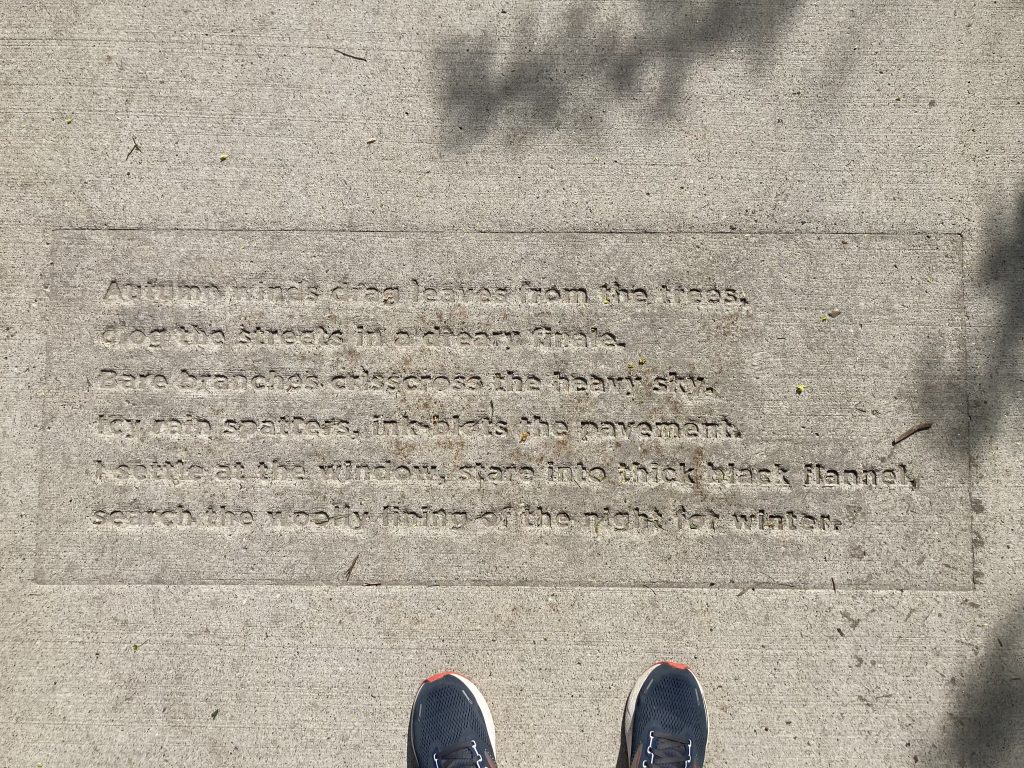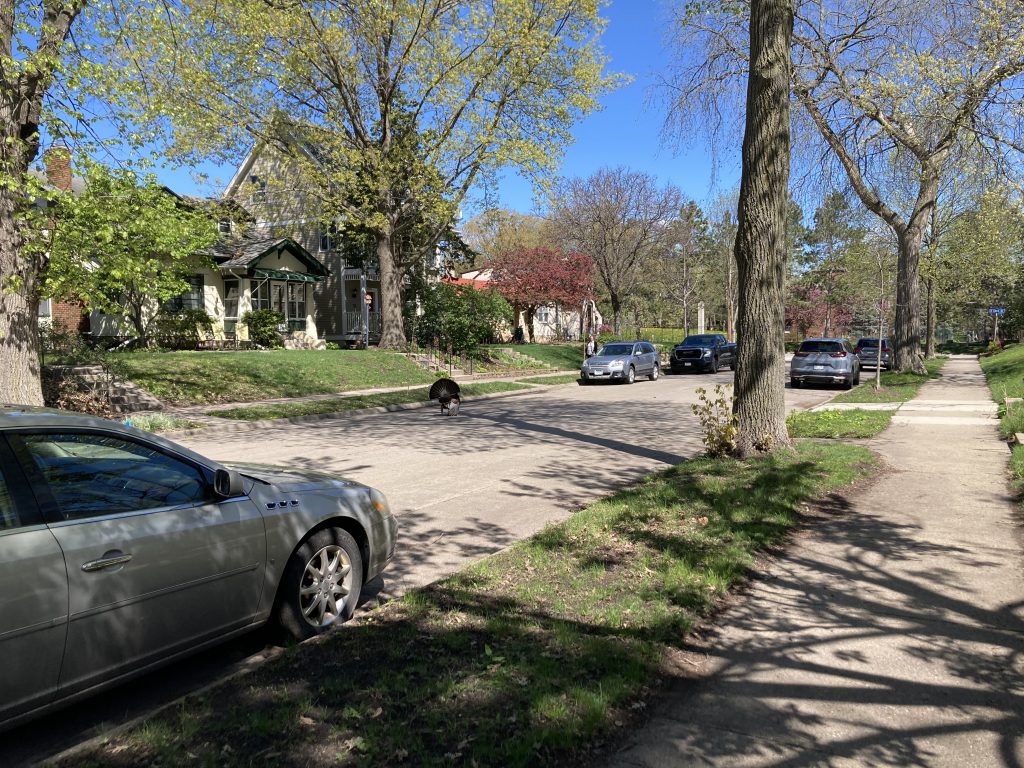4.2 miles
ford loop (short)
56 degrees / humidity: 84%
Sticky with a cool wind. Glad to have my orange sweatshirt on when we started, but happy to take it off after 2 miles. Very moist. I told Scott I felt like one of those sponges you use for moistening stamps — damp all over. This led us to a discussion of how most stamps are stickers now and how hard it is to find non-sticker stamps. I suggested that my comparison — between sweaty me (would that be the tenor of a metaphor?) and the sponge (the vehicle?) — might be a dead metaphor. Then I took it a step further and suggested that stamps and letters were becoming metaphors that no longer worked because people don’t use stamps and send letters as much as they used to. Now it’s all online. This lead us to a discussion of library archives and old papers and what’s being lost when all of our evidence is online (and easily manipulable). I think that conversation was wrapping up as we headed east on the franklin bridge.
I remember admiring the dark, flat river and hearing a far off woodpecker. No sun or shadows today.
note: this paragraph was added later in the today. Earlier I couldn’t remember what we talked about on the east side of the river, finally it came to me. Between Franklin and the trestle on the east side, we talked about Still Life paintings and I mentioned how many dead animals are in the ones I’ve seen — the only way to study them closely — and with pools of blood or strung up, their bodies contorted in grotesque ways — or were those just the still life paintings Diane Seuss picked for her poetry collection? Anyway, I mentioned wanting to play around with different meanings of still: not just keeping still, but enduring. Scott mentioned a whiskey still and I thought that, since we both like bourbon, I should write a poem titled Still Life that was about drinking bourbon.
Sometimes it felt gloomy and sometimes, like walking back over the lake street bridge after we finished, it felt intense, vibrant as a certain slant of light made the green leaves glow. Woah! What a bright green!
After delighting in the green, we talked about the difference between shadows and reflections and I mentioned how I always see the edge of the water, darkened by trees, as shadows and not reflections. Scott couldn’t understand how I would get reflections and shadows mixed up. I couldn’t either until I realized much later that my confusion stems from my vision loss, at least partly. The dark forms at the edge of the shore don’t look like reflections, they look like dark shadows — no details, no evidence that it’s anything but a mass of darkness. When it’s brighter, I can easily see and understand that the smiling bridge in the water is a reflection and not a shadow. Another example: I can picture and imagine easily the difference between the shadow of a cloud crossing over me and the reflection of a cloud on the water.
At the beginning of the run, I recited the Jorie Graham poem I memorized this morning. Then I talked about the other Graham poem I encountered (see below). After I finished reciting the poem — which I did successfully while running! — Scott and I discussed the difficulty of listening to modern poetry and trying to grasp the meaning of strange language, or language used strangely with ears instead of eyes. As part of this, we discussed the oral tradition and its different methods for telling stories that people could make sense of as they listened. Again (because I have mentioned it on this blog before), it makes me want to study more oral forms of poetry, especially as I learn to rely more on hearing rather than seeing words.
a poet speaks to me from across the page
This morning, before running with Scott, after I finished memorizing Jorie Graham’s “Still Life with Window and Fish,” something strange and wonderful happened. Looking through the collection that “Still Life” is from, Erosion, I found another poem I wanted to read: To a Friend Going Blind. I began to read it and, seven lines from the end, there it was, me. Not Sarah but Sara. Out of nowhere, like the narrator or Graham was speaking just to me. Wow. Maybe I’m missing something and her Sara is referencing something earlier in the poem, but reading it for the first time, I gasped. I am Sara, and I am (most likely) going blind, and I know the beauty of the walls.
To a Friend Going Blind/ Jorie Graham
Today, because I couldn’t find the shortcut through,
I had to walk this town’s entire inner
perimeter to find
where the medieval walls break open
in an eighteenth century
arch. The yellow valley flickered on and off
through cracks and the gaps
for guns. Bruna is teaching me
to cut a pattern.
Saturdays we buy the cloth.
She takes it in her hands
like a good idea, feeling
for texture, grain, the built-in
limits. It’s only as an afterthought she asks
and do you think it’s beautiful?
Her measuring tapes hang down, corn-blond and endless,
from her neck.
When I look at her
I think Rapunzel,
how one could climb that measuring,
that love. But I was saying,
I wandered all along the street that hugs the walls,
a needle floating
on its cloth. Once
I shut my eyes and felt my way
along the stone. Outside
is the cash crop, sunflowers, as far as one can see. Listen,
the wind rattles in them,
a loose worship
seeking an object
an interruption. Sara,
the walls are beautiful. They block the view.
And it feels rich to be
inside their grasp.
When Bruna finishes her dress
it is the shape of what has come
to rescue her. She puts it on.
Her use of inside and rich and interruption here surely must be connection to the poem I just memorized: the beautiful interruptions, the things of this world and even the windowpanes are rich and I love it here where it blurs and nothing starts or ends but all is waving and colorless and voiceless.

